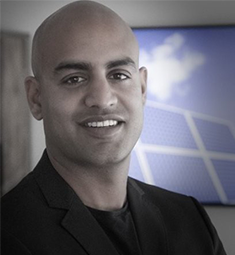Empathy and structure: the key to development for entrepreneurs
Dennis Zaidi was already a successful entrepreneur when he began searching for a program that would take the guesswork out of the business development process. His search led him to the HEC Paris online MSc in Innovation and Entrepreneurship. In this interview, Zaidi explains how his time at HEC Paris gave him a fresh perspective.

Finding a framework
Dennis spent his early career as a self-described serial entrepreneur. “I just have that bug to start and develop businesses and ideas,” he affirms. After launching several businesses in the hospitality industry, he spent four years developing Balsam Lake Green Energy, a project that grew into one of Canada’s largest solar farms. The sale of the business to a private equity fund affiliated with electronics giant Panasonic gave Dennis some time to reflect.
“I realized that so much of what I’d done and so much of what I’d learned was based on rumors, rules of thumb and a lot of gut instinct,” he states. “I took a step back and became interested in developing a more disciplined approach to ideation and entrepreneurship.”
Just as Dennis was beginning his search for a program that could bring a more formal structure to his already-successful business development process, the Zaidi family welcomed their first son. When he discovered the HEC Paris online MSc in Innovation and Entrepreneurship, Zaidi realized he could gain the insights he was searching for while still looking after his newborn son.
Although Dennis was looking for a new approach to entrepreneurship, he was skeptical of how much HEC Paris might be able to teach an already-successful entrepreneur. “I went into the program a little bit cocky and arrogant” he admits, “but it completely changed me as an entrepreneur and as a businessperson.”
The program confirmed the need to combine good instincts with a formalized approach to business development. “I dedicated two years of my life to deep-diving into the most contemporary ideas on what makes a business successful. I was blown away by the tools and perspectives I received on what it means to craft commercially viable ideas.”
A shift to sympathy
For Dennis, the greatest shift in his thinking was the realization that winning business ideas don’t come from a genius working in a vacuum. “I used to think of the entrepreneur as this mythical figure who came up with great ideas and then magically transformed them into businesses," he reveals. “Successful business development is actually about empathy and spending a lot of time trying to understand what people’s problems are.”
Dennis now believes empathy is the key to success in an increasingly competitive marketplace. “Everyone knows 95 percent of startups fail,” he states. “The ones who beat the odds are those who stop looking inward and develop a deep and empathetic understanding of the problems people face and then help them solve those problems.”
Given his experience with social entrepreneurship, the idea of business development driven by empathy rather than ego resonated for Dennis, as did the frameworks HEC Paris taught. “The cornerstone of what I learned through this program,” he explains, “was the powerful range of tools and frameworks that taught me to formally evaluate real problems and how they impact people, and then, with an ultra customer-centric approach, develop an offering that helps solve that problem.”

Getting to the top of the mountain
After graduating from HEC Paris in 2019, Dennis was quickly recruited by a global private equity venture capital firm. He soon noticed that while the venture capital world is full of people with MBAs and finance degrees, those programs don’t teach the skillset needed to evaluate entrepreneurial ideas. “All MBAs have been given is a map of the top of the mountain, but nothing about how to get there,” he affirms. “For me, it’s the opposite. I have the body of knowledge to get a new business to a well-prepared basecamp so they can go make their assault on the peak.”
In his current role, Dennis frequently gives new businesses in the portfolio a crash course on how to succeed using cutting-edge entrepreneurial frameworks. “Two years ago I assumed I’d be stuck in a room trying to dig up new ideas right now. Instead, I’m helping multiple entrepreneurs fulfill their dreams of entrepreneurship,” he concludes, joyfully.